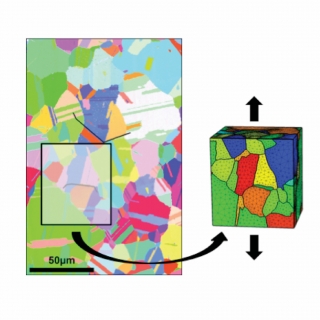
Integrated Computational Materials Engineering
The convergence of new computational capabilities, advanced characterization techniques and the ability to generate and harness large-scale data enables new pathways for the discovery, development and deployment of advanced materials systems. Historically, the lack of an integrated predictive tool set has resulted in strongly experimentally-driven approaches to the development of new materials. While this approach has yielded viable high performance systems, the large experimental matrices demand substantial financial resources and are often too slow to address barriers encountered late in development, either in processing when shortcomings in higher order properties are uncovered or when unanticipated failure modes are encountered upon introduction into a realistic service environment. Given the magnitude of the challenge for a fully computational approach, for the foreseeable future, we are developing approaches wherein new experimental and computational tools are coupled for rapid, iterative discovery and development.
The National Academies wrote a report on integrated computational materials engineering. TMS also published the results of a study on the topic.








